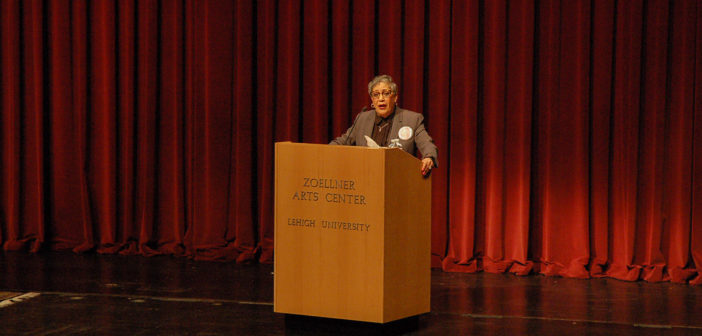In 1967, the Rev. Sharon Washington Risher’s mother brought her to a church to hear Martin Luther King, Jr. give a speech. Though she could not see King from the back of the crowded congregation, she was moved by his message of forgiveness and tolerance.
Four decades later, Risher addressed the Lehigh community in Baker Hall at Zoellner Arts Center as this year’s MLK lecturer. In her talk Tuesday evening, she spoke of loss and reaching forgiveness on her own terms.
The lecture was co-sponsored by the department of Africana studies and the university’s Dialogue Center.
Risher’s mother, Sexton Ethel Lee Lance, was one of the nine victims of the Charleston, South Carolina, shooting in the Mother Emanuel African Methodist Church on June 15, 2015. Among the other victims were two of Risher’s close friends and a cousin.
Risher began the lecture with a reflection of the events that led up to the shooting. She read aloud the names of the victims, pausing for a moment when she reached her mother.
“To say that I am truly overwhelmed with raw emotion 21 months after this tragedy has happened is understating what I truly feel,” Risher said.
Her voice wavered as she described her mother’s life, mentioning how her mother took classes at her daughter’s high school, and they both graduated on the same day. How guests could never leave Lance’s house “without a meal or a trinket.” How her mother’s life tragically ended at the hands of Dylann Roof while he joined Lance’s group for Bible study.
Risher said she was in Dallas when the tragedy occurred, and it took several days for her to gather herself and fly home. Forty-eight hours after the shooting, Risher watched her sister Nadine Collier at a televised press conference.
The reverend was struck by how her sister and other members of the church said they forgave Roof. For Risher, it still felt too soon.
“During the trial, the word ‘forgiveness’ was thrown around like it was any other word,” Risher said. “Most of us don’t take the act of forgiveness as a deep, spiritual process.”
She went on to describe how she sat with 33 members of her parish every day of Roof’s trial, feet away from her mother’s killer. Risher said with the intense media scrutiny and careful attention to the trial, she often felt pressure to forgive him as her friends had.
“Charleston needed that,” Risher said. “The undertones, the political scene, they knew that if it had gotten out of their control, that they were going to have trouble.”
Sidney Ro, ’17, is the only undergraduate member of the MLK committee, the interdisciplinary group that organized the event. The committee, comprised largely of faculty and staff across several departments, spent months researching speakers who would fit its new RaceX initiative. The initiative, launched earlier this semester, aims to address youth activism and social justice through the concept of race.
Ro said Risher was selected as this year’s lecturer for her resilience and her message’s relevance to the RaceX initiative.
“With the history of police brutality, with the Trump presidency, there’s fear,” Ro said. “(Risher) explained it’s not necessarily that we can just forgive. It’s like she said, ‘Know yourself first.’ Know how to take action and how you truly feel in that time.”
Twenty-one months later, Risher has become more open to forgiving Roof and has firmly argued against him receiving the death penalty. She said she is more at peace today, but the grief of losing her mother will never fully escape her. Instead, she honors the legacy of all the Charleston victims, as well as all those affected by gun violence, by campaigning for gun law reform at the national level.
Cindy Stohl, an Allentown resident and an audience member at the lecture, said she was moved by Risher’s vulnerability in describing her loss, especially one that was so highly publicized.
“(Risher) is always going to be followed by her momma’s story,” Stohl said. “By doing this, talking to us, sharing that story, (Risher) can give those victims a happier ending.”
Stohl said she closely followed Roof’s trial and is an advocate for gun law reform, having lost an extended family member to gun violence.
Risher said forgiving Roof would not return her mother to her. Neither would watching him die or seeing a gun law passed. Rather, she finds daily inspiration in helping communities around the nation who have gone through something similar reach their own moments of peace.
“I may never be MLK, but I know my heart is in the right place,” Risher said. “My heart is saving others from the pain of having a loved one taken by a gun.”






Comment policy
Comments posted to The Brown and White website are reviewed by a moderator before being approved. Incendiary speech or harassing language, including comments targeted at individuals, may be deemed unacceptable and not published. Spam and other soliciting will also be declined.
The Brown and White also reserves the right to not publish entirely anonymous comments.